#phonics instruction
Explore tagged Tumblr posts
Text
we’re still teaching phonics. 40 states have passed ‘science of reading’ laws, which for the most part ban the three cueing-system used in prior instructional models. today’s students are absolutely getting systematic phonics instruction in most places.

I was today years old. That is disgusting.
No Child Left Behind is one of the worst things to ever be incentivized in schools. It was signed into law when I was 14. Reading Rainbow was my show as a kid. LeVar Burton played a big part in why I became an avid reader to date. The joy of it. It's an adventure around the globe and through different time periods without stepping on a plane or time machine.
Children parrot behavior. In grade school, I always wanted to read the same amount of books as my teachers (50 books) and managed to double that each year. Before No Child Left Behind, book fairs and Scholastic catalogs were a serious matter like your grandma's Fingerhut catalogs. Libraries were (and still are) a wonderland.
Reading comprehension and proficiency in schools has been declining for decades. A crisis. The joy of books isn't pushed anymore and I'm always saddened by it. It's one of the reasons why I post my book reviews and recommendations on here, as well as posts from others to encourage reading and (novel) writing. Kids will parrot your behavior while the education system sadly fails to return as that example.
#NCLB wrecked education and i’m not arguing against that#but i’ve been using phonics-based instruction for over a decade in my classrooms#we need to swing back to the middle on reading for the love of reading#because we know most kids aren’t doing it at home but increasingly our schedules feel more inflexible#and the last thing i want is for schools to drill down on phonics so deeply that it’s taught in isolation#but the reading instruction is much better now than it was in the heyday of NCLB#teaching
58K notes
·
View notes
Text
For decades, reading instruction in American schools has been rooted in a flawed theory about how reading works, a theory that was debunked decades ago by cognitive scientists, yet remains deeply embedded in teaching practices and curriculum materials. As a result, the strategies that struggling readers use to get by — memorizing words, using context to guess words, skipping words they don't know — are the strategies that many beginning readers are taught in school. This makes it harder for many kids to learn how to read, and children who don't get off to a good start in reading find it difficult to ever master the process.
[...]
Phonics is challenging for many kids. The cueing strategies seem quicker and easier at first. And by using context and memorizing a bunch of words, many children can look like good readers — until they get to about third grade, when their books begin to have more words, longer words, and fewer pictures. Then they're stuck. They haven't developed their sounding-out skills. Their bank of known words is limited. Reading is slow and laborious and they don't like it, so they don't do it if they don't have to. While their peers who mastered decoding early are reading and teaching themselves new words every day, the kids who clung to the cueing approach are falling further and further behind.
2K notes
·
View notes
Text
screenshotting and reposting this because OP made it non-rebloggable but I think it's important to spread it and don't mind blocking post notifs if it blows up on my timeline
(all images have alt text)
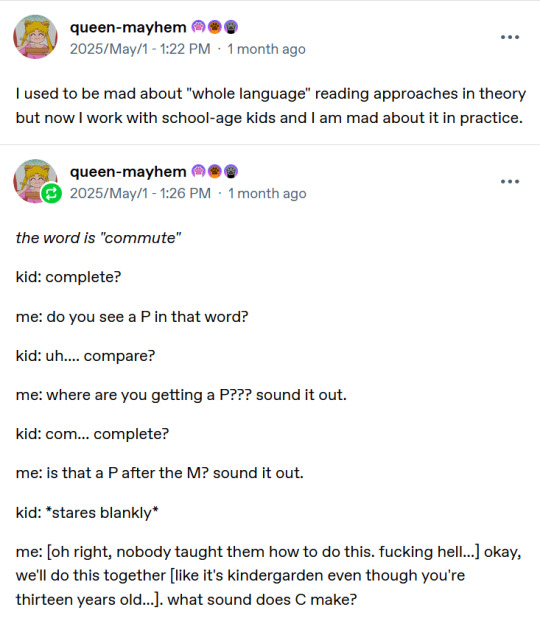
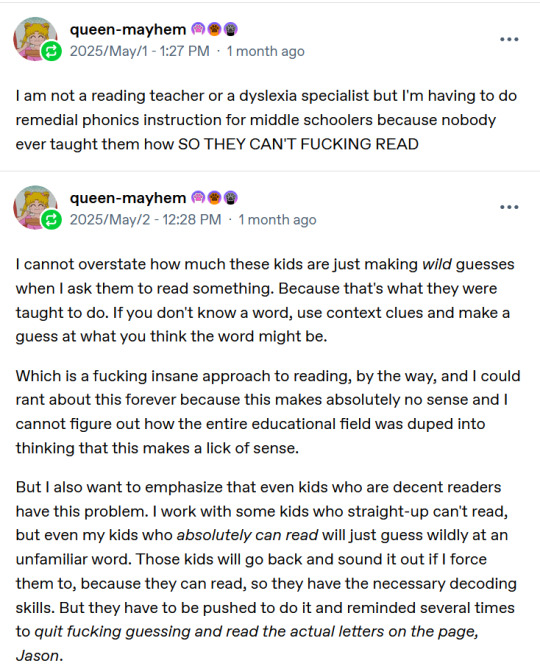
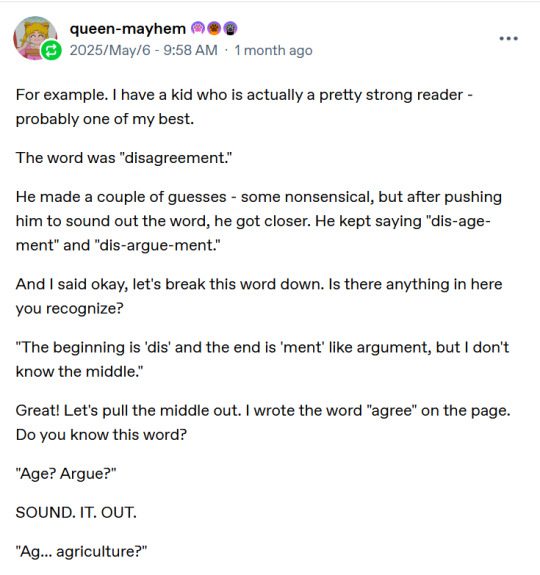

At this point tumblr user @/ms-hells-bells reblogged with this link:
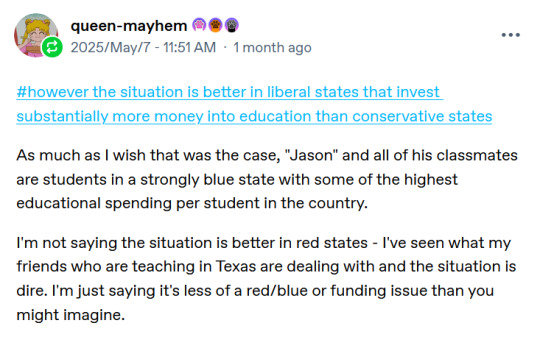

This reblog included this link:

This reblog included this link:
I just personally listened to episodes 1 through 8 of this podcast and believe it to be key in understanding what has happened and why as far as this switch in reading instruction and how things are coming back to phonics (though now they're referring to 'the science of reading' for reasons that are explained in the podcast).
In searching for resources for myself, being a parent, I have found this book with accompanying book for the child, which can be bundled when you select to purchase:
62 notes
·
View notes
Text
one of the key points that emily hanford makes in sold a story is that as a result of the politics surrounding no child left behind, reading pedagogy itself wound up regrettably politicized. the bush administration’s “reading first” initiative was intended in part to bring american classrooms up to date with what was known about the science of reading, including a “back to basics” angle that involved systemic phonics instruction; because this fell under the banner of Bush Education Policy, and also because (as is literally always the case in education) the roll-out was poorly managed, many teachers (as per hanford) rejected it.
what this means is:
(1) if you attended kindergarten through second grade after 2002 and are glad you went to school in the era of phonics, unlike these misbegotten youth, no you didn’t; as the podcast highlights, the initiative failed at scale (although she notes that some teachers in the few districts where implementation was handled with care found the professional development around it useful)
(2) if you attended kindergarten through second grade in the 90s and are glad you went to school in the era of phonics, unlike these misbegotten youth, no you didn’t; the rise of phonics as a battle in 2001 onwards indicates that it was not in fact settled practice at that point, as indeed does the resistance practicing teachers mounted to being asked to incorporate systemic phonics instruction. balanced literacy, the approach sold a story spends much of its time critiquing, is typically said to have arisen in the 90s.
(3) if you went to elementary school before the 90s, tbh you’re also on thin ice wrt these claims, because whole language, the pedagogical model to which balanced literacy is in theory a more phonics-friendly update, is based on a set of theories originating in the 60s & 70s and probably hit its peak in the 80s, with the balanced literacy of the 90s being seen as a “compromise” between whole language and a more traditional approach.
(4) the traditional approach featuring phonics doesn’t mean that it taught phonics well enough for all students to succeed. hanford early on in the podcast includes the story of an adult who never successfully learned to read in school. this person was a vietnam veteran.
remember: some kids can in fact learn to read without much instruction in phonics, or with essentially a basic overview. tbh unless you received remediation/support for a learning disability, i would not draw any conclusions from your fuzzy childhood memories and the mere fact that you can read about whether or not your school was teaching reading right. (to give one example from my fuzzy childhood memories - if your first grade teacher taught you “when two vowels go a walkin, the first one does the talking,” as mine did in 1994 or so - that was teaching phonics poorly! that’s not a rule it’s recommended to teach, because it’s not reliably true! if it was enough for you, that says more about non-classroom factors in reading success than it does about your first grade teacher, who may have been lovely in other ways.) on the other hand, teachers certainly have always existed who have been more proactive than the field at large about incorporating science into their practice (or, alternately, recalcitrant about change in ways that sometimes have benefits lmao); having lucked into one or several of those doesn’t mean you grew up in the era of phonics, because, like, there are so many fucking teachers in this country.
#posts brought to you by a reply i saw where someone said they went to high school in 2014#and they could see the difference that dropping phonics made between the grade band#no you couldn’t. not a thing.
33 notes
·
View notes
Text
Recently, through Twitter, I have become aware of the fact that modern American parents have been very ignorant of their parental duties when it comes to their children. Parents are banding together to complain about the schools their children attend because their kids are getting bad grades in class, or they're getting detentions for doing bad consistently, or they're being held back because they're just not at the same level as their peers.
There was an entire thread of some woman whining about how the school was failing her kid, because his English class grade was so bad. There were thousands of comments agreeing and various reposts with anecdotes from other parents with similar experiences.
"My 26 y/o son can't even write a check for God's sake!"
And one single person finally replied with, "Do you guys not teach your kids anything at home before they start going to school?" Which then spawned people with actual common sense questioning the level of involvement these people had in the lives of their kids.
This is what led to a large surge of people complaining about how it's the school's job to teach them everything and they did their job just keeping them alive.
Now, I don't want to be mean, but it's gonna come across that way.
Parents are lazy these days.
When I was a child, my Nana and mom had me learning with Hooked on Phonics before I entered pre-K. I was 3 years old and already sounding out words that rhymed. I was practicing how quickly I could say them in under 30 seconds so I could progress to the next lesson.
mat hat sat that cat vat pat bat fat lat rat brat
etc...
When I was in pre-K(4 years old), they had a single, really old computer that had a bunch of Winnie the Pooh CD-ROM games. Because I always got my work done faster than everybody else, they let me use the computer because I could actually read and follow Pooh's instructions, and it kept me busy.
And when I entered kindergarten for the first time, I was really surprised to see that Hooked on Phonics was actually part of my curriculum and I was already very well ahead of everyone else. My mom and Nana took traching me very seriously. They not only read to me, but they would also get me Madeline books and cassette tapes from the children's library downtown. And then I would listen to the cassettes telling the story while reading the book at the same time to get used to the words.
At three years old, I was helping out in the kitchen, learning all of the different kitchen utensils and types of measurement. My mom often went between English, French and American Sign Language at random times so I picked up a lot of stuff that way. We never had a computer in the house for the first 12 years of my life, but I did have an old keyboard to learn how to type. Nana gave me basic piano lessons for a couple years. Mom taught me how to hem my clothes because she would buy me bigger clothes, hem them to size, and then let them out as I grew. Hell, Sperm Donor taught me how to write a check when I was 8. He was also a Financial Adviser, so I got a lot of lessons on money management, investments, and 401Ks and shit.
All these incredibly simple things ended up benefiting me later on, because I was so far ahead of all of the other students that it consistently put me at odds with them. I was better at reading, cooking, sewing, music, languages, etc... I was allowed time to do whatever I wanted while the rest of them had to catch up.
There is a lot more to being a parent than just making sure your kid eats three meals a day and doesn't die in a stupid way. And it seems like a lot of parents these days have completely forgotten that they have a duty to their kids beyond the feeding and clothing thing.
Certain things SHOULD be taught in schools, like how to balance a checkbook. But if it's clear that the school won't cover it, why aren't YOU doing something about that? And why do so many parents have no clue what the hell their kids are even getting up to in school? Why don't y'all get involved in your kid's lives?
98 notes
·
View notes
Text
Obviously the factors here are 1) when did you learn to read and 2) were you forming many memories then. Personally I'm not sure when I picked up reading, but I know it was by 5. I have a couple memories of being younger than 5, but none pertaining to reading, so I said no. I just don't remember what it felt like to look at words and not understand them
#i know i was reading by 5 cause thats when i started kindergarten#and i did not enjoy being taught how to read when i already knew#they were teaching us how to sound out things by phonics and i was like wow i hate this and also its useless to me#also at that age i was like compulsively reading i could not stop myself from reading any words around me#i would sit in a room and if not otherwise occupied just read any text i could see over and over again#and in kindergarden the teacher would put the overhead projector next to my desk and i could read the like cleaning instructions#and every time id be like GREAT now i gotta read this
208 notes
·
View notes
Note
can you make a fic abt ha sangmin from a killers paradox there like lil to none fics abt him
tw stalking
note sorry this is so short / ive never actually watched a killer paradox so i hope i have able to write him correctly 🙂↕️
the second he saw you he knew he had to have you. in every sense of the word. needed to smell you when you woke up, needed to feel your warmth when he fell asleep, needed to see your face when... well. you were a new hire at the coffee shop he frequented. just a random picked off the street because you knew how to follow instructions. a foreigner here on a school visa just trying to make ends meet. a person just going through the motions.
"Small, hot, 2 creams."
"Alright, anything else for you today?"
"That's all."
this went on for week, one small coffee always made the same way. your hands working to make it perfect, just for him. each time you hand it over his fingers graze yours, and each time his heart thumps annoyingly in his chest. of course you have no idea, your smile never faltering and your voice syrupy sweet. he watches you after work, that stupid vape always in your hand as you walk to your car. his shirt pressed and his shoes perfectly polished as he sinks lower into his seat. the view of you slowly becoming less and less enough.
"Hey, you're that barista, right? Beans Beans?"
"Yeah. Small, hot, 2 creams, right?"
he was lucky, to have found you. to see you during a daily run through the jung district. sunlight harsh on your eyes as you cover your forehead. you give him that customer service smile, your face softer as it becomes genuine. shifting on your feet, he thinks you'll run off right then and there. leave him behind as you continue your routine. instead your feet stay planted despite the small movements and sways as you talk.
"You always look so fancy. Where do you work?"
he smiles at you, your korean was tolerable. some words come out wrong or confusing, but he simply smiles and continues.
"Some car company, it's pretty boring."
"I'd still like to know."
"Hyundai Motor. It's monotonous. Same shit, different day."
"Oh, like those suvs? I used to have one before I moved here. It was nice, leather seats that you could warm up. I miss it."
"Exactly. Have you been able to get another one?"
"I think it's a Ford, i don't know. It's my roommates car. I just borrow it for work and school."
"What do you go to school for?"
"I'm here to be an english school teacher, I'm hoping to move here permanently in a few years."
"After your Korean gets better?"
"Is it really that bad?"
"It can always be better. You seem to understand it fine, it's just your phonics are off."
"I could always use a teacher, mine are all busy half the time." he doesn't respond, just stares at you for a few beats.
"Sorry, that was way too forward of me."
"Not at all," he gives you a small smile. "I could teach you."
"Really? That's awesome! Here."
you fish your phone out of your pocket and click it open. unlocking it you pull up your contacts and hand the phone over to him.
"Put your number in."
he take it, his fingers brushing against yours. so pretty. typing in his number he sends himself a message before handing it back. you smile and slide your phone back into your pocket. rubbing your hands together you give a quick clap.
"Thank you for the help, well pre thank you. I have to go, but I appreciate you a lot."
you give him one last smile before running off again. he follows you with his eyes before you disappear out of view. he continues walking without a destination in mind.
8 notes
·
View notes
Note
weird question but how did you learn Spanish n German?
I'm originally from Spain, so I got Spanish for free. I learned German specifically to do Der Wolfsjäger, with a combination of Duolingo classes, practice and instruction from German friends on Discord and ear training from listening to German audiobooks. I started just doing accent training, and then moved on to the actual language after getting a basic handle on German phonics and accent pronunciation.
35 notes
·
View notes
Text
In literacy in the USA news!
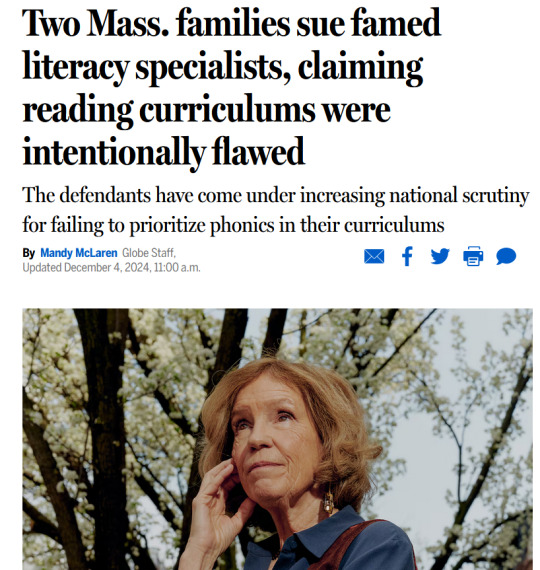
The summary is that parents are suing the people who sold reading curriculum to the Massachusetts school system. These curriculum allegedly ignored decades of science on the efficacy of phonics teaching in reading and literacy, and focused instead on "picture power". The parents allege that they had to pay for private tutors to help their children learn to read proficiently.
Archive link to full article.
Full text of article below the cut:
From Globe.com
By Mandy McLaren
In what appears to be a first-of-its-kind consumer protection lawsuit, two Massachusetts families are suing famed literacy specialists Lucy Calkins, Irene Fountas, and Gay Su Pinnell, their companies, and their publishers, alleging the former teachers used “deceptive and fraudulent” marketing practices to sell curriculums that ignored the scientific consensus about the importance of phonics to early reading.
The lawsuit, expected to be filed Wednesday in Suffolk Superior Court, alleges three minors, identified in the complaint by their initials, suffered developmental and emotional injuries, while their parents, identified as Karrie Conley of Boxborough and Michelle Hudak of Ashland, suffered financial losses, having paid for tutoring and private school tuition to compensate for the flawed reading curriculums used by their children’s public schools.
“I trusted that when I was sending my children off to school, they were getting instruction that had been tested and proven effective,” Konley said during a virtual press conference Wednesday morning. “... This isn’t some luxury we’re asking for. This is reading.”
The lawsuit, shared with the Globe in advance, alleges the defendants ignored a plethora of research demonstrating the importance of phonics, or the relationship between letters and sounds, in creating, marketing, and selling their early literacy products and services. The omission of phonics from their curriculums was intentional, despite widely known evidence of its importance, the complaint alleges.
“Defendants denigrated phonics at worst and paid mere lip service to phonics at best,” the lawsuit reads.
A lawsuit represents only one side of a complaint. Representatives for the defendants did not return an immediate request for comment, though Calkins, Fountas, and Pinnell have in the past denied any wrongdoing.
The Massachusetts lawsuit represents a new step in the early literacy advocacy movement and could spur new complaints like it nationwide. It follows several years of heightened debate surrounding the “science of reading,” a broad body of research demonstrating how the brain learns to read and which shows a firm grasp on phonics to be key to early reading success.
At issue in the complaint is whether the literacy authors knowingly ignored scientific research and purposely sold “defective and deficient” curriculums to school districts across Massachusetts. The lawsuit argues the authors and their publishers did and in doing so broke a state consumer protection law.
“Defendants knew or should have known they were committing unfair and deceptive acts,” the complaint reads.
Rather than emphasizing phonics, or the sounding out of words, Fountas and Pinnell, longtime publishing partners, and Calkins have come under increasing scrutiny for their curriculums’ cueing directions, which instruct children to, for example, look at a picture for context in helping determine an unknown word. In Calkins’s curriculum, Units of Study, this skill has been called “picture power.”
The Massachusetts Department of Elementary and Secondary Education, which considers the defendants’ curriculums to be low quality, has doled out millions of dollars in grant money to help local school districts purchase new materials grounded in reading science. A 2023 Globe investigation found nearly half of all school districts in the state were using a low-quality curriculum in their elementary schools, and, of those, nearly 3 in 4 were using either Calkins’s or Fountas and Pinnell’s materials.
#literacy#media literacy#american school system#reading#readblr#bookblr#books and reading#bookworm#news#american news
13 notes
·
View notes
Text
Every day I log on and see misinformation about the US public school system...

They never stopped teaching phonics guys. It was nationally debated and established as essential in the 90s.
This misinformation comes from the fact that around this time direct phonics instruction was being supplemented by some practices that were supported by shitty/non-existent research. This has been steadily phased out over the last 5-10 years across the US. Also, this was all shit that started in NEW ZEALAND and was being done in every english speaking country in the world. The quality of the US school system is neck-to-neck with all english speaking nations. Worldwide, our students are slightly above average in reading and slightly below average in math.
The problem is that none of these truths are interesting or exciting enough to become editorials or podcasts, so instead we have half-truths about a "reading crisis" in the US (supplemented by the real loss of learning created by the pandemic) being used to fearmonger and further debilitate trust in the public school system.
You will never catch me saying that the US public school system is perfect, but conservatives are trying to gut and privatize it and everyone is playing into their hands. People are using misinformation to make it sound like no one is learning to read anymore, that literacy levels are the lowest they've ever been, that US schools are the worst in the world.
Gag me with a spoon. The truth is boring and mediocre ¯\_(ツ)_/¯
27 notes
·
View notes
Note
What do you do for work if you don’t mind me asking
Currently I’m a TOSA (teacher on special assignment). I work at a title one school and pull small groups for phonics/reading instruction. The poor babies are very behind :(
38 notes
·
View notes
Text
okay you know how i was lowkey losing my mind bc i felt like i failed as a teacher bc a student barely failed the sol i was asking the instructional coach about it and he reminded me that this student came into third grade barely being able to read like significantly behind but was interesting and didn't really qualify for reading intervention because in isolation phonics skills seemed fine. Now with more experience, i will probably raise hell in the future over a situation like this because ummm don't make me study ✨ the science of reading ✨ and get mad when i push back using the knowledge i've learned about how complex reading is. but i took that information and said okay bet i'll teach individual phonics lessons. i'll administer the core phonics survey myself. i'll work every single day to practice reading, spelling, and comprehension 1:1 or in a small group. i think given the situation and my experience that's incredibly impressive. this child can for the most part read on grade level and will probably for real catch up next year. so i no longer feel like i failed and am really proud of myself but now know i will fight like hell over this situation in the future!
6 notes
·
View notes
Text
i have so much to say about literacy and the lack of it,
I know that three-cueing is garbage. Phonics needs to be taught explicitly. There's a lot that goes into reading. Kids need to learn and practice a variety of skills that do need to be taught and modelled. Phonics and phonemic awareness are crucial to literacy.
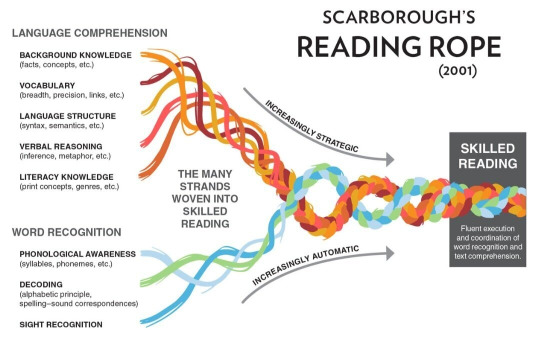
There's something to be said about background knowledge and using some context clues to support your understanding of a text. A specific example is one of my students struggles with reversals. I'm monitoring, we're practicing, but he still has difficulty. So he might read the sentence "Jack pet the dog" as "Jack pet the bog". Since he has trouble with reversals, even with about 5 different strategies that I've tried, he still can't always see that it is a d instead of a b. So I ask him: "Does the sentence make sense?" He will think, say no, and try again, this time saying dog. It works because he has used phonics to 'tap' out the words he wasn't sure of, and then is starting to self-correct using context. Wonderful!
So while there's truth to three-cueing and a lack of explicit phonemic and phonological instructions, there's another part.
Reading to your children is also critical. First, it is a great bonding time. Second, it helps to model fluency and expression. Third, if you talk about what you're reading (ie, make predictions, ask questions about the story, make connections to the story), you can develop reading comprehension. Fourth, building vocabulary. Fifth, you can build a connection between the words you're saying and the words on the page fairly easily if you model following along with your finger while you read. Sixth, showing that reading can be fun, important, worthwhile, etc.
Additionally, increasingly, there are other factors at play. It is difficult to teach when I have so many disregulated students. I know educators are feeling it and often feel there is no support from home. Education can feel like an uphill battle with kids who have behavioural, emotional, and physiological needs that aren't being met. The waitlists for support are getting longer and longer, and the resources are becoming scarcer in many cases. I spend my time fighting to get OT, speech, and mental health supports for students, only to get denied by families who don't think their kids need it. Or to find out that the organizations we reach out to are down to 1 [specialized professional]. There aren't enough resources, not enough time in the day, and not enough home support.
I have three EAs in my room but the needs are so vast that supporting with education is frequently overridden by more pressing matters such as regulating big emotions, mitigating behaviours, etc.
The field of education is not easy, i find myself often feeling like I'm failing or not accomplishing enough, but there's only so much that I can control and accomplish and I'm sure many educators feel the same way. I'm not sure what the solution is, however, I can only play my part.
2 notes
·
View notes
Text
ok also. i think a thing people don’t get is that “make students read whole books” was a radical intervention in US reading pedagogy that also came from the same people who started the anti phonics crusade. and then in theory we all settled on balanced literacy which is the best of both worlds but in practice, well, all kinds of things bc US education is so numerically large and decentralized it’s shockingly difficult to meaningfully generalize about. lol. anyway so like as i keep saaayiiiing there is no mythical past where We Taught Reading Good and if you have ever looked at Wack Ass Stuff being promoted as the teaching of reading and thought “thank god my teachers did it right”: they almost certainly didn’t, you’re probably just in the lucky half or so of the population that didn’t need that much instruction.
#where’s the other half? well we can start with: A Truly Staggering Percentage Of The Prison Population#the learning disabilities / literacy & prison stats are……… Rough
31 notes
·
View notes
Text
Browser View | Sign Up
WhatMatters
Your guide to California policy and politics

By Lynn La
May 1, 2025
Presented by Child Care Providers UNITED, Climate-Smart Agricultural Partnership, California Primary Care Association and First 5 LA

Good morning, California.
Federal crackdown on CA immigration increases even as justice system finds problems

People detained inside the Golden State Annex, a U.S. Immigration and Customs Enforcement detention facility in McFarland, on July 8, 2024. Photo by Larry Valenzuela, CalMatters/CatchLight Local
Let’s dive into some immigration news:
Proposed detention center?: As President Donald Trump and his administration continue to crack down on immigration, the federal government is eyeing opportunities to dramatically expand the number of immigration detention centers. Federal officials in April started eyeing Fairfield’s Travis Air Force Base as a possible site, according to KQED. The base is one of at least 10 other military bases in the U.S. under consideration. A month earlier, demonstrators rallied at the Federal Correctional Institution in Dublin after internal emails revealed that the Trump administration was considering the now-shuttered prison for women as another possible detention facility.
A lack of proper care: The California Department of Justice released a 165-page report Tuesday detailing the conditions of the state’s six, privately-operated active immigration facilities, writes CalMatters’ Wendy Fry. State investigators found that the sites had “deficiencies in suicide prevention and intervention strategies,” staffing shortages and a lack of coordination between medical and mental health care providers. The conditions, such as solitary confinement, can exacerbate mental health issues that many detainees already have, including anxiety and post-traumatic stress disorder. The report also found that more than 3,100 people were held in immigration detention centers as of April 16 — up from the daily average of about 1,750 in 2021. About 75% of those detained had no documented criminal history. Read more here.
Temporary order on Border Patrol: Wendy and CalMatters’ Sergio Olmos also report that a California judge has temporarily barred Border Patrol agents from making immigration stops unless they have a reasonable suspicion that the person is in the U.S. illegally. The injunction also prohibits agents from carrying out warrantless arrests unless they have probable cause that the person is likely to escape before a warrant can be obtained. The order stems from a lawsuit filed by the American Civil Liberties Union on behalf of the United Farm Workers, after Border Patrol agents in January conducted a three-day sweep in Kern County. A CalMatters investigation revealed that agents had no criminal or immigration history on 77 of the 78 people it arrested from the sweep. Read more here.
Join CalMatters and Evident in San Francisco today for a screening of Operation: Return to Sender, a short documentary uncovering what really happened during a three-day Border Patrol raid in Bakersfield. After the film, CalMatters’ Sergio Olmos and others will discuss what the team uncovered and what it means for immigration enforcement. Register today.
Other Stories You Should Know
A ‘reading wars’ compromise

Students in a sixth-grade class read at Stege Elementary School in Richmond on Feb. 6, 2023. Photo by Shelby Knowles for CalMatters
On Wednesday state lawmakers reworked a bill that now seeks to provide funding for phonics-based instruction in K-12 classrooms without requiring schools or teachers to implement it.
As CalMatters’ Carolyn Jones explains, the measure’s new language signals a compromise between two camps of educators who argue that reading programs should either emphasize phonics, or the sounding-out of words; or sight reading, which focuses on memorizing words by sight.
The measure would require the state to provide training for teachers and instructional materials on the phonics reading approach. Because English learner advocates have criticized the phonics method for being too confusing for students who are not English proficient, the bill also requires materials and training to address the specific needs of English learners. (About 18% of California’s K-12 students, or 5.8 million, are English learners.)
The bill replaces another proposal, which died last week, that would have required schools to use the phonics-based approach.
Read more here.
Two chairpersons get ‘rolled’

State Sen. María Elena Durazo during the Senate Committee on Health at the Capitol Annex Swing Space in Sacramento on April 9, 2025. Photo by Fred Greaves for CalMatters
A Senate bill that would boost housing development near public transportation hubs has advanced through two Senate committees — despite strong objections from both leaders of the committees, writes CalMatters’ Ben Christopher.
The rather unusual development could indicate a “philosophical split” among Democrats related to the state’s approach to building more housing, said longtime California lobbyist Chris Micheli.
In one corner are the Democrats, including bill author Sen. Scott Wiener of San Francisco, who want housing to be easier, quicker and cheaper to build. In the other are Democrats who do not oppose more housing, but are concerned with issues related to private development, regulation and affordability. This group includes the two chairpersons of the Senate’s housing and local government committees, Sens. Aisha Wahab of Fremont and María Elena Durazo of Los Angeles, respectively.
Wiener, however, disagrees that there may be a deep rift within the party when it comes to housing.
Wiener: “You have two chairs who have just a different perspective and that’s normal and, you know, I appreciate that we’ve been able to go through this process very respectfully. We’re all grown ups.”
Read more here.
And lastly: Kaiser labor talks

Kaiser Permanente’s mental health care workers protest outside its Sunset Boulevard facility in Los Angeles on Feb. 7, 2025. Photo by J.W. Hendricks for CalMatters
After more than six months on strike, Kaiser Permanente’s Southern California mental health workers are resuming negotiations. CalMatters’ Joe Garcia and video strategy director Robert Meeks have a video segment on the record-setting labor dispute as part of our partnership with PBS SoCal. Watch it here.
SoCalMatters airs at 5:58 p.m. weekdays on PBS SoCal.
California Voices
CalMatters columnist Dan Walters: The Legislature is considering a bill that would restore a key ability local governments would have over public pensions — yet no local governments so far have voiced any opinion about the bill.
CalMatters contributor Jim Newton: The impressive and painstaking efforts of local community groups and nonprofits to restore Los Angeles’ MacArthur Park represent civic reclamation in action.
Other things worth your time:
Some stories may require a subscription to read.
Trump-appointed Californian shakes up civil rights unit at the Justice Department // Los Angeles Times
CA’s elections chief pushes back against GOP efforts to limit voting rights // San Francisco Chronicle
Newsom says CA is doing ‘DOGE but better’ in jab at Musk // Politico
Newsom supports push to make it a felony to purchase minors for sex in CA // KCRA
Affordable housing developers say they need steady cash. Will CA provide it? // KQED
CA high-speed rail leader pushes state to support private investment // AP News
Study: Powerful earthquake could raise Pacific north-west sea levels ‘dramatically’ // The Guardian
Major Canadian airline cuts SF flights as Trump backlash intensifies // San Francisco Chronicle
State will deliver more water to Southern CA this year via State Water Project // Los Angeles Times
LAFD union head made $540K in a year, with huge overtime payouts // Los Angeles Times
See you next time!
Tips, insight or feedback? Email [email protected]. Subscribe to CalMatters newsletters here. Follow CalMatters on Facebook and Twitter.
About Us· How We're Funded· Subscribe· Donate
CalMatters 1017 L Street #261 Sacramento, CA 95814 United States
2 notes
·
View notes
Text
How to Choose the Best Learning App for Preschoolers: A Parent’s Guide!
Introduction
In today’s digital age, educational apps have become a popular tool for early childhood learning. With hundreds of apps claiming to be the best preschool learning apps, choosing the right one for your child can feel overwhelming. While these apps can offer engaging and interactive ways to teach basic skills like math, language, and problem-solving, it’s important to select one that is both effective and safe.
This guide will help you understand the key factors to consider when picking a learning app for preschoolers, ensuring it enhances your child’s education while keeping them entertained.
Prioritize Age-Appropriate Content
When selecting a preschool learning app, ensure the content is tailored to your child’s age and developmental stage. Preschoolers typically benefit from activities that focus on:
Basic math skills – Counting, shapes, and simple patterns.
Language development – Alphabet recognition, phonics, and early vocabulary.
Creativity and problem-solving – Puzzles, drawing, and storytelling activities.
An app that offers progressive learning—starting with simple activities and gradually
increasing in difficulty—will help your child learn at their own pace.
Interactive and Engaging Features
A learning app for preschoolers should be fun and interactive. Look for apps with:
Colorful visuals and animations – These capture attention and make learning enjoyable.
Gamified learning – Apps that use rewards, badges, or challenges motivate children to keep learning.
Audio instructions – Clear voice prompts can help non-readers navigate the app independently.
Interactive features keep children engaged, making the learning process feel like play rather than a chore.
Educational Value and Skill Development
The best preschool learning app should go beyond entertainment and promote skill-building. Choose apps that cover a variety of subjects, including:
Math and logic skills – Basic counting, addition, and shape recognition.
Language and literacy – Letter recognition, spelling, and vocabulary building.
Creativity and imagination – Drawing, music, and storytelling activities.
Apps like Kiddopia, for instance, offer a balanced mix of education and creativity, making learning both fun and impactful.
Easy Navigation and Kid-Friendly Interface
Preschoolers need apps with simple, intuitive navigation. Look for:
Large, colorful buttons – Easy to tap for small fingers.
Clear voice instructions – To help non-readers understand the tasks.
No complex menus – Simple layouts with clear categories and minimal distractions.
A child-friendly interface ensures that your child can explore the app independently, boosting their confidence.
No Ads and Privacy Protection
When choosing a learning app for preschoolers, safety is paramount. Opt for apps that:
Have no third-party ads – Ads can be distracting and potentially expose children to inappropriate content.
Follow strict privacy policies – Check if the app complies with COPPA (Children's Online Privacy Protection Act) standards.
Offer parental controls – To limit screen time or restrict in-app purchases.
Safety-first apps provide a secure learning environment for your child.
Trial Period and Reviews
Before committing to a subscription, look for apps that offer a free trial period. This allows you to test the app’s features and see if it suits your child’s learning style. Additionally:
Read reviews from other parents – Their feedback can give you insights into the app’s quality and effectiveness.
Check app ratings – Higher ratings often indicate better performance and reliability.
Apps like Kiddopia offer a 7-day free trial, allowing you to explore its extensive features before subscribing.
Conclusion
Choosing the best preschool learning app involves more than just downloading the first option you find. Prioritize age-appropriate content, interactive features, educational value, and safety. Apps like Kiddopia combine fun and learning seamlessly, offering expert-designed activities that promote early childhood learning. With the right app, your preschooler can develop essential skills while enjoying a playful and engaging educational experience. To explore a trusted and effective learning app, try Kiddopia’s 7-day free trial by visiting: Kiddopia.
2 notes
·
View notes